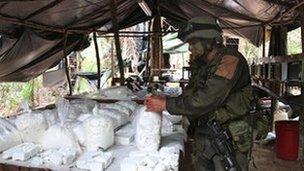Colombia cocaine production drops 25%, says US report
- Published

Colombia's pure cocaine production has fallen 25% in the past year, and 72% since 2001, according to US figures.
This places the country behind Peru and Bolivia for the first time since 1995, the White House report says.
It credits the decline to Plan Colombia, a US-backed initiative to crack down on Colombian drug cartels.
The report diverges from a UN study released last week, which said cocaine production had remained stable.
The latest US estimates were released by the Office of National Drug Control Policy (ONDCP).
According to the new survey, production of pure cocaine in Colombia fell from an estimated 700 tonnes in 2001 to 195 tonnes in 2011.
In comparison, Peru had produced 358 tonnes in 2010 and Bolivia 265 tonnes in 2011, the report said.
Overdose deaths
ONDCP director Gil Kerlikowske called the study's results a historic achievement.
"They have tremendous implications, not just for the United States and the Western hemisphere", he said.
"This is the first time since 1995 that Colombia is producing less cocaine than either Peru of Bolivia."
Mr Kerlikowske said the decline was largely the result of Plan Colombia, a US taxpayer-funded military-aid programme.
The $7.5bn initiative was launched in 1999 to help the Colombian government combat drug trafficking and terrorism.
"The security threat that the United States and Colombia faced in 1999 is gone," said Mr Kerlikowske.
He added the drop in Colombia's production had also coincided with a decline in US cocaine overdose deaths, positive workplace drug tests and domestic cocaine seizures.
But the White House figures conflict with a report released last week by the United Nations Office on Drugs and Crime.
The UN report estimated Colombia's cocaine production at 345 tonnes in 2011, which it said represented a drop of only 1% compared with 2010.
- Published23 June 2010
- Published13 June 2010
- Published17 June 2012